#john nathan turner
Text
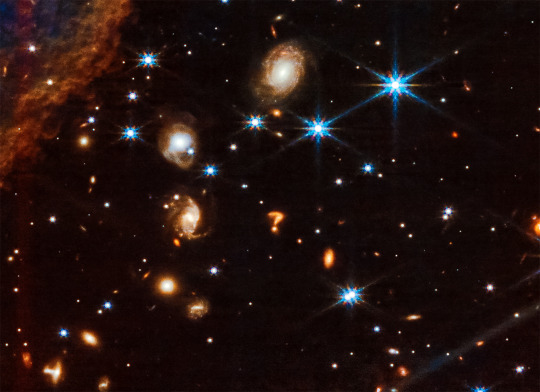
RIP John Nathan Turner, you would of loved space question mark.
#classic who#doctor who#john nathan turner#JNT#sixth doctor#I get why people blame/hate JNT but a lot of the things he did were pretty cool and we're too mean to him
52 notes
·
View notes
Text
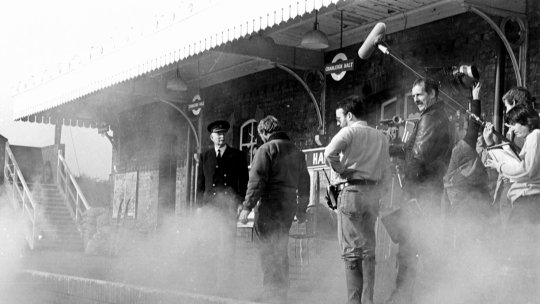


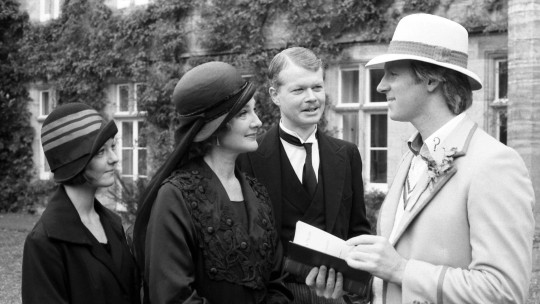
BTS - Doctor Who : Black Orchid
Original Transmission Date: 1st March 1982
#peter davison#doctor who#classic doctor who#tardis#nyssa of traken#tegan jovanka#john nathan turner
22 notes
·
View notes
Note
Anon here again, It was because I was reading about the JNT-Ian Levine feud as they were so close from Season 18 until the Grade hiatus then everything went south quickly after Ian pissed off JNT by leaking to the audience at one of the big cons that Who was only coming back as a 14 part series . Of course 14 part seasons would be the norm until Survival. Compare that to 26 parts until Jon and Tom. Levine and JNT never reconciled.
Ohhhh I see now... thanks for the context! That is a real shame.
4 notes
·
View notes
Text
Just found out Adric's actor, Matthew Waterhouse was openly gay when he was on Doctor Who.
How cool is that?
#It definitely helped that the showrunner (John Nathan Turner) at the time was a gay man.#Loon.txt#Doctor Who#Adric#Matthew Waterhouse
28 notes
·
View notes
Text
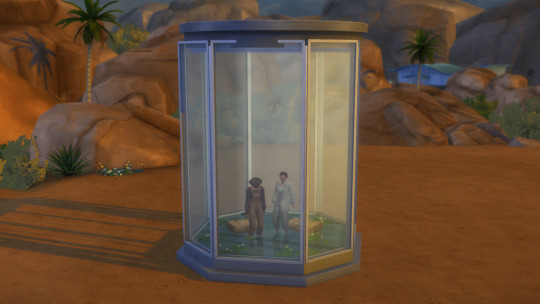
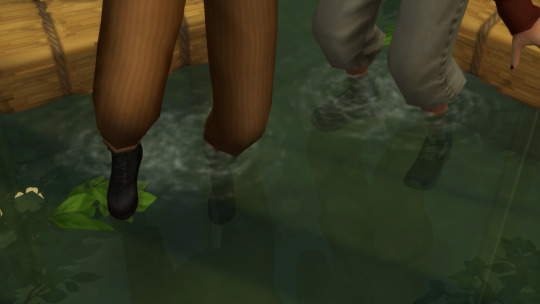
checked on the Jar Girlfriends™ (Tegan and Nyssa) and the jar had filled with green goo(?) so I've given them bus tram money and sent them to go clean up a gross underwater swamp crocodile-monitoring station while I wash out the jar.
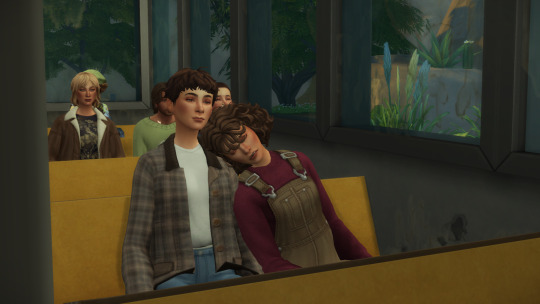
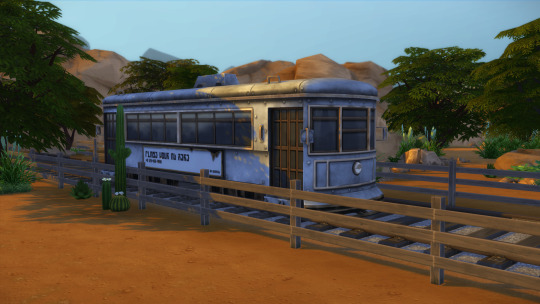


(prev. post for this)
#keep an eye on them for me please I'm busy and ill#also yes I gave them new outfits who do you think I am john nathan turner#we've got like. a Story now so#jar gfs<3#me👩❤️💋👩plot contrivances#nyssa of traken#tegan jovanka#tyssa#tegan/nyssa#tegan x nyssa#doctor who#the sims 4
2 notes
·
View notes
Text
literally never seen any group of people more insane about the showrunner/producer/script editor eras of a tv show than doctor who fans like people are at each others fucking throats about chibnall vs rtd vs moffat and people each have their personal favorite and the other who they think destroyed the show and then this also extends back somehow to now i am finding people tying their hatred of someone on the reboot to their insane lines in the sand about jnt or whatever and dying on this cross also literally you people are completely fucking insane why is everyone like this can anyone be haters in a normal fashion please
#also fascinated to realize people are like entire jnt era girlies#like i knew there were the cartmel die hards or obviously the douglas adams or robert holmes appreciators but#everything ever made while john nathan turner was in charge ok sure
5 notes
·
View notes
Text
Madame Vastra Actress, Neve McIntosh, to Star in New All Creatures Great and Small
Madame Vastra Actress, Neve McIntosh, to Star in New All Creatures Great and Small
Neve McIntosh, who Doctor Who fans know best as Madame Vastra, stars in tonight’s episode of All Creatures Great and Small.
McIntosh made her Who debut in 2010’s The Hungry Earth/ Cold Blood as Silurian sisters, Alaya and Restac, before being welcomed back as Vastra in A Good Man Goes to War. Now, she appears as Miss Harbottle in Channel 5’s revival of All Creatures Great and Small.
Rachel…

View On WordPress
#A Good Man Goes To War#All Creatures Great And Small#Big Finish#Cold Blood#John Nathan-Turner#madame vastra#Neve McIntosh#Peter Davison#Samuel West#The Hungry Earth
2 notes
·
View notes
Video
Sophie Aldred Interview | Doctor Who | The Power of the Doctor | The Time Scales
Sophie Aldred portrayed the Doctor's companion Ace during the late 1980s alongside Sylvester McCoy. She talks her return to the program in Jodie Whittaker’s swansong.
#youtube#Sophie Aldred#Ace McShane#Dorothy Gale McShane#Dorothy McShane#Jodie Whittaker#TARDIS#Sylvester McCoy#John Nathan-Turner#Russell T. Davies#Chris Chibnall
3 notes
·
View notes
Text
🚢Boat Song Lineup & Links🚢
*links are on the boat emojis. most of the artists listed are specific to the linked versions, and many are folk songs with no single or known author. all the links are youtube links.*
🚢 32 Down on the Robert MacKenzie (Due South), Paul Gross
🚢 A Pirate Looks at 40, Jimmy Buffett
🚢 A Sailboat in the Moonlight, Billie Holliday
🚢 The Ballad of Gilligan's Isle (theme song)
🚢 The Ballad of Harbo and Samuelson, Shanghaied on the Willamette
🚢 The Bonnie Ship the Diamond, The Corries
🚢 Bluenose, Stan Rogers
🚢 Boat on the River, Styx
🚢 Canadee-i-o, Nic Jones
🚢 Come Sail Away, Styx
🚢 Day-O (Banana Boat Song), Harry Belafonte
🚢 Friggin in the Riggin, The Sex Pistols
🚢 Ghosts of Cape Horn, Gordon Lightfoot
🚢 Go to Sea No More, The Dubliners
🚢 The Good Ship Kangaroo, Planxty
🚢 Hard on the Beach Oar, Johnny Collins
🚢 Haul Away Joe, The Eskies
🚢 Highwayman, The Highwaymen
🚢 I'm on a Boat, The Lonely Island
🚢 I'm Shipping up to Boston, The Dropkick Murphys
🚢 James Craig, The Maritime Crew
🚢 The Last Bristolian Pirate, The Longest Johns
🚢 Leave Her, Johnny, Leave Her, Coda
🚢 The Leaving of Liverpool, The Dubliners
🚢 The Little Boat, The Wiggles
🚢 Lord Franklin, Pentangle
🚢 Lowlands Away, The Corries
🚢 Lukey, Great Big Sea
🚢 The Mariner's Revenge, The Decemberists
🚢 Marie Christine, Gordon Lightfoot
🚢 The Mary Ellen Carter, Stan Rogers
🚢 Mingulay Boat Song, The Corries
🚢 Mr. Andrews' Vision ("Titanic: A New Musical"), Maury Yeston
🚢 The Mistress, Dramtreeo
🚢 My Sails Are Set (One Piece live action)
🚢 Orinoco Flow, Enya
🚢 Overture/Prologue/The Launching ("Titanic: A New Musical"), Maury Yeston
🚢 The Pacific, Dave Malloy
🚢 The Pirates Who Don't Do Anything (Veggie Tales)
🚢 Proud Mary, Ike and Tina Turner
🚢 Race to be King, Seth Lakeman
🚢 Rolling Down to Old Maui, Stan Rogers
🚢 Roll the Old Chariot (sea shanty)
🚢 Round the Cape, The Longest Johns
🚢 Row, Row, Row your Boat (nursery rhyme)
🚢 Running Down to Cuba, Colm McGuinness
🚢 Sailing, Christopher Cross
🚢 Sailor's Farewell (sea shanty)
🚢 Santiana, The Longest Johns
🚢 Santiano, Hugues Aufray
🚢 Saturday, Jonathan Eng and Stephanie Hladowski
🚢 Save the Whales!, Country Joe McDonald
🚢 Ship in a Bottle, Fin Argus
🚢 Ship of Fools, The Grateful Dead
🚢 Song for the Bowdoin, Larry Kaplan
🚢 Song of the Volga Boatmen, Soviet Army Chorus & Band
🚢 Son of a Son of a Sailor, Jimmy Buffett
🚢 South Australia, Johnny Collins
🚢 Tow Rope Girls, Daniel Kelly
🚢 The Wellerman (sea shanty), Nathan Evans
🚢 The Wild Cape Horn, Friends Of The Shipyard and Fisherman's Fayre
🚢 The Wreck of the Edmund Fitzgerald, Gordon Lightfoot
🚢 Warlike Seamen, Jerry Bryant and Starboard Mess
#PLEASE let me know if any of the links are wrong or dead so i can update them#song tourney info#boat media tourney#long post
184 notes
·
View notes
Text
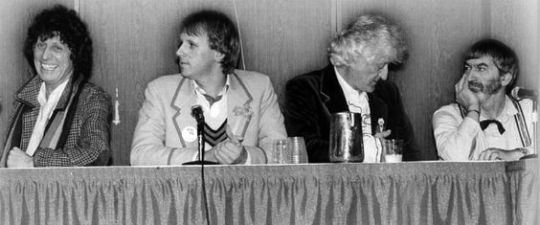
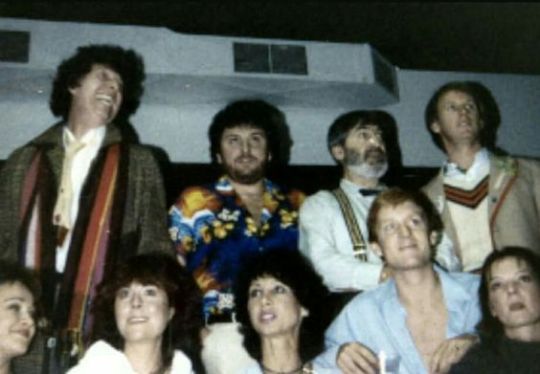
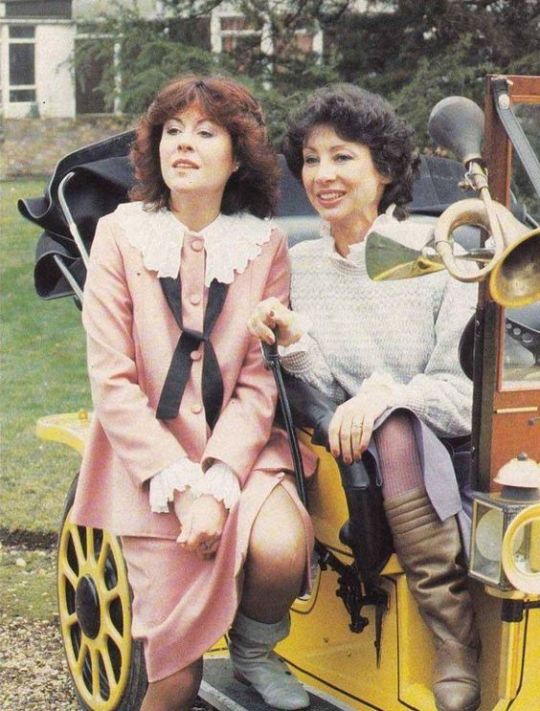
Tom Baker, Peter Davison, Jon Pertwee and Patrick Troughton
Let's see if i can name everyone in the second pic: Tom Baker, John Nathan-Turner, Patrick Troughton, Peter Davison, Janet Fielding, Elizabeth Sladen, Carole Ann Ford, Mark Strickson and idk who that woman is but i think that's everyone in it
Liz and Susan on bessie
38 notes
·
View notes
Text
How to request:
Send your request featuring the character you want, the plot (+ANGST, FLUFF…) and anything I need to know about the reader.
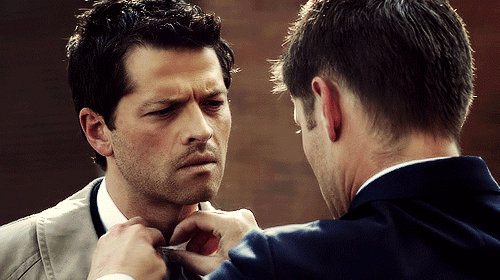
MASTERLISTS:
MOVIES/TV SHOWS
KDRAMA/KPOP
OCs PROFILE:
@nathan-ocs
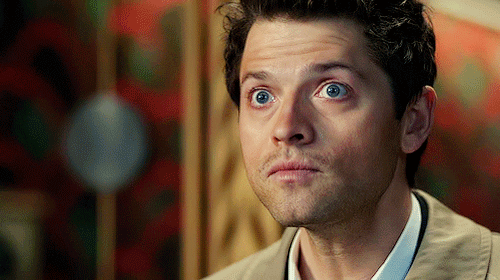
Fandoms I write for under the cut!
——————————————
NCIS
Timothy McGee
Jimmy Palmer
Nicholas Torres
CRIMINAL MINDS
Spencer Reid
Penelope Garcia (platonic🫶)
Luke Alvez
CALL OF DUTY (MW/WWII)
John Price
Soap MacTavish
Ghost Riley
Gaz Garrick
Alex Keller
Alejandro Vargas
Phillip Graves
Vladimir Makarov
Rudy Parra
Red Daniels
William Pierson
Joseph Turner
Robert Zussman
Frank Aiello
Drew Stiles
SHAMELESS
Ian Gallagher
Carl Gallagher
Lip Gallagher
Mickey Milkovich
Kevin Ball
THE WALKING DEAD (+TELLTALE GAME)
Rick Grimes
Daryl Dixon
Glenn Rhee
Negan Smith
Shane Walsh
Lee Everett
Kenny
Doug
Mark
STRANGER THINGS
Steve Harrington
Billy Hargrove
Robin Buckley (platonic)
Eddie Munson
Jim Hopper
Jonathan Byers
Peter/001
Jason Carver
Dimitri
THE UMBRELLA ACADEMY (I still need to finish the last season😊)
Viktor Hargreeves
Klaus Hargreeves
Diego Hargreeves
Number Five
Luther Hargreeves
Ben Hargreeves
SUPERNATURAL
Dean Winchester
Sam Winchester
Castiel
Crowley
Bobby (platonic)
Chuck
NOW YOU SEE ME
Jack Wilder
J. Daniel Atlas
Merritt McKinney
Dylan Rhodes
Chase McKinney
MARVEL (Avengers/X-men)
Wanda Maximoff
Tony Stark
Bruce Banner
Thor Odinson
Loki Laufeyson
Steve Rogers
Stephen Strange
Peter Parker (Tom/Andrew/Tobey)
Clint Barton
Deadpool
Bucky Barnes
Sam Wilson
Peter Quill
Quentin Beck/Mysterio
Eddie Brock/Venom
Druig
Ikaris
Charles Xavier
Erik Lehnsherr
Peter Maximoff
Wolverine
Scott Summers
Hank McCoy
Bobby Drake
Alex Summers
Phil Coulson
Marc Spector/Steven Grant/Jake Lockey
Scott Lang
Pietro Maximoff
Mobius M. Mobius
Matt Murdock
Shang-chi
STAR WARS
Anakin Skywalker
Luke Skywalker
Obi-Wan Kenobi
Kylo Ren
Poe Dameron
Finn
TEEN WOLF
Stiles Stilinski
Scott McCall
Derek Hale
Isaac Lahey
Jackson Whittemore
Peter Hale
Theo Raeken
Liam Dunbar
Jordan Parrish
Mason Hewitt
Danny Mahealani
Aiden Steiner
Ethan Steiner
Corey Bryant
THE BOYS IN THE BAND
Bernard
Harold
Hank
Donald
Cowboy
Alan McCarthy
Michael
Larry
Emory
WHITE COLLAR
Neal Caffrey
Peter Burke
Mozzie (platonic)
Clinton Jones
DIVERGENT
Peter
Caleb Prior
Four
HARRY POTTER
Neville Longbottom
Sirius Black
Cedric Diggory
Seamus Finnigan
Viktor Krum
Remus Lupin
Draco Malfoy
Tom Riddle
Charlie Weasley
Fred Weasley
George Weasley
Percy Weasley
Ron Weasley
Oliver Wood
FANTASTIC BEASTS AND WHERE TO FIND THEM
Gellert Grindelwald (Mads Mikkelsen)
Newt Scamander
Credence Barebone
Theseus Scamander
Albus Dumbledore (Jude Law)
HUNGER GAMES
Peeta Mellark
Coriolanus Snow
Sejanus Plinth
MAZE RUNNER
Newt
Thomas
Gally
Minho
911 (and LONE STAR)
Evan Buckley (Buck)
Howie Han (Chimney)
Bobby Nash
Eddie Diaz
TK Strand
Carlos Reyes
Paul Strickland
Owen Strand
Jud Ryder
Mateo Chavez
RIVERDALE
Jughead Jones
FP Jones
Archie Andrews
Hiram Lodge
Sweet Pea
Fangs
Kevin Keller
Reggie Mantle
Chic
Moose Mason
BROOKLYN99
Jake Peralta
Terry Jeffords
All the others (platonic only)
CHRISTIAN BALE
Patrick Bateman (American Psycho)
Bruce Wayne (Batman)
PEDRO PASCAL
Joel Miller (TLOU)
Din Djarin (The Mandalorian)
Javi Gutierrez (The Unbearable Weight of Massive Talent)
Javier Peña (Narcos)
Oberyn Martell (Game of Thrones)
Agent Whiskey (Kingsman)
Silva (Strange Way of Life)
Francisco Morales (Triple Frontier)
Marcus Moreno (We Can Be Heroes)
Dieter Bravo (The Bubble)
DETROIT BECOME HUMAN
Connor
RK900
Hank
Markus
Luther
Simon
Gavin
Josh
BARBIE
Ken (Ryan)
Ken (Simu)
Allan
SHERLOCK
Sherlock Holmes
John Watson
Jim Moriarty
Mycroft Holmes
FNAF (movie)
Mike Schmidt
Steve Raglan
SUITS
Harvey Specter
Mike Ross
LA CASA DE PAPEL
El Profesor
Berlín
Palermo
Denver
Río
I WON’T WRITE:
-Smut (for anyone)
-R*pe
-Female readers/GN readers
-Suic*de
-inc*st
-Crossdressing
-Romantic/Suggestive stories for underage characters (only platonic, basically)
If the character you wanted to request is not on the list, you can try and ask me anyways.
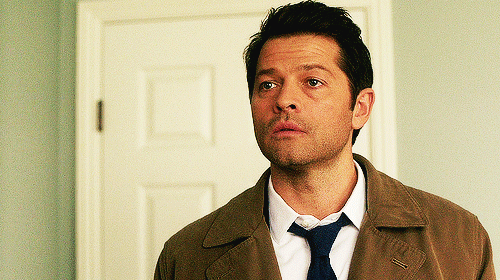
#x male reader#shadowhunters x male reader#Harry Potter x male reader#maze runner x male reader#fantastic beasts and where to find them x male reader#divergent x male reader#jumanji x male reader#white collar x male reader#Shazam x male reader#it x male reader#train to Busan x male reader#squid game x male reader#move to heaven x male reader#marvel x male reader#avengers x male reader#supernatural x male reader#shameless x male reader#criminal minds x male reader#NCIS x male reader#Wednesday x male reader#riverdale x male reader#Pedro pascal x male reader#patrick bateman x male reader#Brooklyn nine nine x male reader#Barbie x male reader#Detroit become human x male reader#male reader#la casa de papel x male reader#suits x male reader
294 notes
·
View notes
Text
𝐚𝐥𝐰𝐚𝐲𝐬𝐦𝐨𝐧𝐜𝐡𝐞𝐫𝐢’𝐬 𝐜𝐡𝐚𝐫𝐚𝐜𝐭𝐞𝐫 𝐥𝐢𝐬𝐭
return to — navigation
joe keery | joseph quinn | timothée chalamet | andrew garfield | tom hiddleston | tom holland | ryan gosling | henry cavill | hayden christensen | callum turner
blaise zabini | theodore nott | cedric diggory | dean thomas | draco malfoy | fred weasley | george weasley | harry potter | ron weasley
james potter | siruis black | regulus black | remus lupin
theseus scamander
anakin skywalker | obi wan kenobi | poe dameron | luke skywalker | han solo | din djarin
andrew!peter parker | loki laufeyson | 1610!miles morales | pietro maximoff | tony stark | steve rogers | james buchanan barnes | tom!peter parker
peeta mellark | finnick odair | coriolanus snow
bruce wayne | jason todd | dick grayson
pete “maverick” mitchell | bradley “rooster” bradshaw
steve harrington | eddie munson | jonathan byers | lucas sinclair
spencer reid | aaron hotchner | derek morgan
jake peralta
jj maybank | pope heyward
miguel diaz | robby keene | young!daniel larusso
james conrad | nathan drake | walter “keys” mckey | bruce wayne | dick grayson | jason todd | jess mariano | brian o’conner | ethan landry | indiana jones | lord tewkesbury | theodore “laurie” laurence | five hargreeves | jim halpert | todd anderson | count vronsky | john “bucky” egan
keep in mind I would consider writing for other characters so if you have a specific request feel free to send it to my inbox <3
8 notes
·
View notes
Video
youtube
Why Whovians HATE John Nathan-Turner - Doctor Who Discussions
6 notes
·
View notes
Text
A Finely Tuned Response - Frontios, 1984
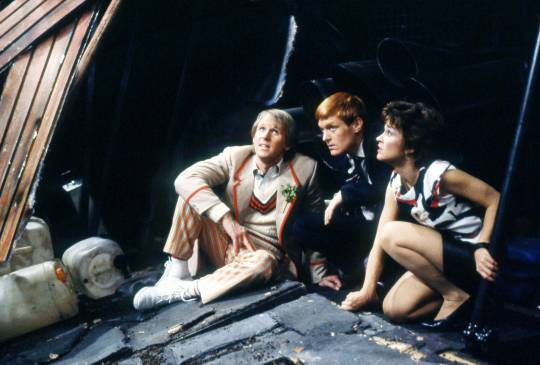
An analysis of Doctor Who of the early to mid 1980s is, somewhat inevitably, an examination of wasted potential and this is a particularly pertinent point to consider when embarking on a critical look at Frontios. To some extent, Frontios is business as usual for the Peter Davison era. Along with The Awakening, it stands-out for being one of only two stories in the season that is not carrying the weight of an enormous event. It is four episodes long, features a typical Doctor Who monster, slots itself effortlessly into the action-packed militaristic flavour of the Davison era and repurposes the trappings of past base-under-siege serials for good measure. This is probably why it gets such little attention from the fandom on the whole; Frontios is a story conceived to slip under the radar.
But I think that Frontios does anything but be unnoticeable. It is screaming to be noticed because I think that this story, more than any other of the Davison era, is the story of untapped potential. Frontios takes everything that we know about the Davison era, every aspect of it that was working, and offers us a glimpse into an alternate reality where everything else also works just a little bit better still. This is thanks to former script editor Christopher H. Bidmead, one of a handful of writers who could comfortably stake the claim of one of the most underrated in the series' history. Bidmead script edited the show from 1980-1981, the entirety of season eighteen, and is notable for following through with John Nathan-Turner's intention to shift the style of storytelling in Doctor Who away from the high-concept, camp adventure series of the previous regime toward more serious-minded stories that had a basis in real-world science. In Bidmead's own words, "[Doctor Who] exemplified for young viewers the power of scientific thinking to solve problems. Science stretched into fantastic future shapes, yes, but the show had a serious social purpose. It must never be silly, never be mere magic....we tried to build our stories on solid, if fancifully extended, scientific ideas."
It is worth stating the obvious here; this philosophy returns the show to its 1963 roots of being educational as well as entertaining. The result of Bidmead and JNT's collaboration was a run of seven stories that had an entirely unique flavour for the franchise. Stories that were rich in theme and subtext, revelling in the unknown possibilities of bleeding edge theories. Take Warrior's Gate, for example. Taking place in the theoretical zero point between positive and negative space, that serial watches like a surreal, poetic and atmospheric novel that meditates on I-Ching philosophy, exploring notions of action, free-will and entropy. Warrior's Gate is a dense and thoughtful production whose characters and setting all interlink to form a greater thematic whole. A bit over twelve months later, Doctor Who was broadcasting stories like Earthshock.
That sounds a little bit more disingenuous than perhaps it should because Earthshock is not a bad story in and of itself but it is a very different story. The tumultuous production of Warrior's Gate and the overall difficulties of Bidmead's position lead to his resignation at the end of season eighteen. The post would eventually be filled by Eric Saward whose conception of what made for a good Doctor Who story wildly contrasted with Bidmead's. Earthshock proved to be the template, the definitive statement for what his ambitions were with Doctor Who; a thrilling, action-packed adventure with a confident blend of character drama and sci-fi serial antics. To use a low-hanging and easy shorthand example, if Bidmead's Doctor Who could be compared to say a Christopher Nolan film then Saward is somewhat of a Zack Snyder.
But this brings us back to the accusation of wasted potential because I would argue that the Fifth Doctor's era is marked by inconsistency more than it is by abject failure. I find it rather interesting that both JNT/Bidmead Who and JNT/Saward Who make a concerted effort to return the programme to something resembling the original conception of the show but in polar opposite ways. In the latter case, it was a more superficial attempt with the turn back toward an ensemble cast and the attempt at tighter stitching from one serial to the next. Most episodes of the Davison era connect in some direct way to the previous one, even if that connection usually little more than a couple of lines at the top of the episode addressing something from the previous one.
The approach that JNT and Saward were aiming for in these three years together, that of an explosive science-fiction soap-opera, is a perfectly valid take on the programme. It was even an effective one on occasion. The problems with Saward's tenure as script-editor are myriad and deserving of dissecting in a piece more dedicated to him but suffice it to say that what Frontios accomplishes is a case of a serial coming together in spite of its circumstances instead of coming out of them. When Bidmead was invited back as a freelancer for Davison’s third, and final, season, he incidentally offered a tantalising glimpse into the era that might have been if he had stuck around with the show. If nothing else, he reaffirms one thing; wildly creative and conceptual science-fiction stories can work hand-in-hand with serialised, evolving character drama.
In contrast to what one might expect, Frontios can perhaps best be described as Bidmead’s most traditional Doctor Who story. Saward invited him to contribute a pitch for a serial in season twenty-one but on the condition that he was to craft something in the mould of a traditional Doctor-Who-monster-plot. As Bidmead recalled in a 1988 interview for Doctor Who Magazine; "Eric Saward phoned me up and asked me to do ‘Frontios’. They wanted the monster element, which was a struggle because I always hated ‘Doctor Who’ monsters – partly because they tend to look cheap and mainly because they are so limited on dialogue. Dialogue is so important in a low budget show – it creates the whole effect". In so far as being a typical monster story for Doctor Who, the broad strokes of Frontios appear to offer little in the way of innovation. Our trio unexpectedly find themselves among colony of humans in the far future only to quickly discover that an unknown, alien threat is causing colonists to disappear into the planet itself. On one level, perhaps this is disappointing for the staunch season eighteen fans (god forbid those nerds ever out themselves) that Bidmead’s final effort on-screen is such traditional fare but, make no mistake, this is Bidmead all over. Where else would one find a story that revels so much in making the setting a character unto itself, or an active threat in this case. There is an almost primal irrational fear underpinning the horror of Frontios which is that of the Earth dropping from beneath you, consuming you without a trace. It is a great idea and legitimately terrifying at a conceptual level. Frontios is the last hope for humanity, the final place that they can run to and this here is the horror at the end of human existence; what comes for us all when there is nowhere left to run?
Frontios is a story about people being where they shouldn’t which is about as clued-in to the central premise of Doctor Who as one could possibly be; the entire franchise is a story of things being where they shouldn't. I love the Doctor’s initial flat refusal to explore Frontios in any way because “knowledge has its limits”. It is an interesting slice of lore, that never really gets picked up on again, that the Time Lords have a limited scope of the arc of history. Perhaps because pulling on this thread could lend too much credence to the theory that Time Lords are future human beings. After all, is there any particular reason why the Time Lords knowledge has a cut off point that coincides with the near end of humanity? It is an effective shorthand to illustrate the stakes at play here and set the scene for the audience but remains an oddly intriguing nugget of lore too. I would not be surprised if this story directly influenced Russell T Davies when he came to writing Utopia since that story also presents the Doctor as going further than ever before and having the immediate reaction of wanting to leave. In this case, I adore that as soon as the Doctor does land, he immediately launches into helping the humans despite what his rational mind has concluded. It is also a little bit weird that the Doctor’s behaviour ultimately leads to no consequences from the Time Lords. We are told repeatedly that he is forbidden to interfere here and that the time laws do not permit his actions. If Saward were a bit more on his ball, perhaps this could have been the inciting incident that puts the Doctor back on trial two seasons from now as opposed to just…well, nothing really.
Bidmead does not write small scale stories. Even this one, which is relatively small fry in the narrative of this season, is as high stakes as actually destroying the TARDIS. Bidmead claims to have done this to give the Doctor no form of security, have him just as desperate and endangered as the humans. Everything is against the Doctor here which makes for a nice unintentional parallel to The Caves of Androzani (also penned by a former script editor) where the same can be said but he’s just a lot less lucky. What is frustrating is that the script makes really no attempt to explain exactly why or how the TARDIS is destroyed. The Gravis does not even know it is there. The Doctor does have one line about it toward the climax; "It's, er it's been spatially distributed to optimise the, er, the packing efficiency of, er, the real time envelope" which sounds dreadfully like he is making it up. Is he suggesting that the TARDIS folded in on itself in an effort to protect itself from the meteor strike? Or was the meteor strike actually supposed to have splintered it? Surely not that second thing since Tegan and Turlough found it to be largely closed off just moments after landing, I have no idea what is really going on here and have yet to find a clear answer in the text but it is a lovely way to visually illustrate the consequences of the Doctor going behind where he even feels he is permitted to travel.
If there is anything that significantly hurts Frontios then it is the production. While not necessarily cheap, the horrific cliffhanger to part three is realised about as well as it could be, this story is hampered by shoddy direction from Ron Jones and some generally poor design. A lot of the horror that ought to be here is nearly squandered by the way the thing is assembled and that is truly frustrating. There is some god awful acting attempting to ‘lift’ some rubble in episode one. How that made it to screen I will never know. In concept, the Tractators are a deeply disturbing villainous creature with their inhuman features and mental powers to ensnare any victim they choose no matter how hard they run. Their plot to chop up human beings to ensure their machinery works was so freaky that Steven Moffat likely stole it to be much scarier in 2006. Bidmead based the monsters on woodlice and, while that intention extended into the design, the Tractators are the textbook definition of a lumbering “Doctor Who monster”. Practically every moment of action they have in the entire story falls completely flat and the monsters are not even remotely scary. They just look like crap. Apparently Jones hired dancers as he imagined the Tractators to curl up like woodlice, something that Bidmead intended in the script. Visual effects designer Dave Harvard did not get this memo it seems. There is a distinct lack of menace and thrill displayed onscreen here despite what are, really, a perfectly strong set of scripts to work from. It is a real shame.
Thankfully, the production can deliver on Bidmead's well-developed supporting cast and he provides a compelling far-future colony for the TARDIS team to get entangled up with. Range is a much an endearing scientist figure to pair the Doctor up with as Plantagenet and Brazen make an irritating opposing force. It is a decidedly bleak vision of the future; a fascist, totalitarian state. In her analysis of the serial, Elizabeth Sandifer makes the suggestion that Bidmead’s more cerebral, world-building story is constantly under jeopardy by Eric Saward’s stock-standard military story, invading the scenes as an opposing force that tries to stop the story from happening. Whether Bidmead was deliberately poking at Saward's tendencies as a writer remains to be seen but it is a very fun read regardless. Bidmead has cited the 1982 Lebanon War as an influence on his scripts which, as of time of writing this article in March 2024, is an interesting situation to cite. The Lebanon War took place between June 6 1982 and June 5 1985 between the Israel Defence Forces and the Palestine Liberation Organisation. The inspiration from the war can certainly be identified in what Frontios would become though it would be absurd too suggest that the story is analogous for the conflict itself. Certainly, the broad strokes of the situation informed the plot but the most significant contribution was an aesthetic one with the serial's war-torn landscape that is clearly suffering from a near constant bombardment that has slowly increased in frequency and intensity over several decades. Indeed, as Range and the Doctor state;
RANGE: Captain Revere assumed that the barrage was some sort of softening up process. Heralding an invasion, he said.
DOCTOR: Hmm, someone else thinks this is their territory.
Revere is half-right. Frontios is an invasion story; the humans are the invaders. This flavour of anti-colonial storytelling is not particularly new ground for Doctor Who to tread and would certainly continue to be well-walked although the allegory becomes a little bit murky in this case with the suggestion that the Tractators are not indigenous to Frontios either. Perhaps the situation of two invading forces staking claim to a land that rightfully belongs to neither was ripped straight from the headlines but the absence of a third party makes it a rather more simplistic and less challenging situation to depict. Again, the influence is purely aesthetic. Cutting edge political satire doesn’t seem to be something Bidmead is particularly interested in anyway, regardless of his effectiveness in writing it.
So, we can conclude that the Tractators are likely not indigenous from pretty early on in the story thanks to Turlough who is awarded one of his strongest roles in any story pos-Enlightenment. Following his failed plot to murder the Doctor, the shifty and morally ambiguous nature of Turlough became an aspect of his character that was largely cast aside. Turlough was introduced as an untrustworthy and selfish survivalist whose past life before exile on Earth were primed to make him a greatly compelling member of the TARDIS team moving forward. However, instead of gradually unravelling this mystery and pushing Turlough’s relationship with his “friends” to their furthest extent, the character spent most of his stories was just separated from the Doctor for about half of the runtime to simply complain and look a bit suss from time to time. A lot of potential character work seemed to be abandoned and relegated to these four scripts and his final story, Planet of Fire. This is yet another example of Saward's limits as a script editor and really the most damning one considering part of this period's mission statement was to be a quasi soap-opera.
After laying eyes on the Tractators, we see a new side to Turlough; pure, genuine fear. Our first glimpses at his origins are finally awarded to us when a race memory is unlocked within him that sees him recoil from the action in a catatonic state. He has a primal reaction to the creatures below the surface. Being the only person with knowledge of the monsters, he gradually pulls himself together and returns to help the Doctor. While not especially interesting an arc in itself, this is a rewarding series of events to put Turlough through if you have been following his story since Mawdryn Undead since it seems that only now he has truly embraced being a force for good with the Doctor and not just a traveller in it only for himself. This is all really solid stuff and Mark Strickson does a decent enough job with it. Turlough lamenting that nobody expects anything heroic of him is a really lovely character moment and this story marks a significant turning point for the character that comes too late. This is the kind of on-going melodrama that should have been present in this era the entire time and this particular development for Turlough needed to happen at, at the latest, the end of the last season. Not two stories before his departure. For his active role as a companion to be claimed eight stories into his run (effectively after twenty-eight episodes on the show) is ludicrous. Even more frustratingly, Turlough takes a backseat again in the next story leaving Planet of Fire to race his character to the finish line and it proves once more that the potential for greatness is all there but this was too little too late.
Tegan is the most sidelined of the three which is irritating not only because this would prove to be her penultimate appearance on the show but also because it officially becomes a pattern of the third story now to give her no kind of active role in narrative. The next serial would do that too though it could be argued by design which is a weak defence in the face of a whole season awarding her next to no material. Given where her character was set to go in Resurrection of the Daleks this and the nature of her departing the TARDIS, this would have been a great time to highlight the brutality of the Doctor’s travels and drop her in the midst of some truly awful acts. Long-form story was really not Eric Saward’s strongest skill.
And then we have the Doctor. Three stories away from his own dramatic exit and finally he feels like he has fully come into his own. This is perhaps the most frustrating realisation to grapple with in regards to Bidmead’s leaving the show; the man knows how to write the Doctor. His take on the character sees the frustratingly underdeveloped Fifth Doctor in a fully authoritative role; barking out orders and opinions to whoever he pleases and commanding presence as much as he needs to. This is a character I would have loved to see for three seasons and it pains me that he is only really found here and in Androzani. At the heart of Frontios is a very simple story that about leadership in a decidedly anti-militaristic sort of way. The humans are being driven by the military but lacking in unity as their leadership in Brazen and Plantagenet is a self, arrogant and narrow-minded leadership that dismisses their scientists and the Doctor when he arrives. As we learn about the Tractators, their leadership is flawed too as the creatures are revealed to be naturally passive without the command, being enslaved, by the Gravis. So, we have the Doctor who is driven but understanding. He listens to the facts, he makes measured judgements and he considers the breadth of his actions. The Doctor is the shining example of good leadership in this colony. It is a very simple moral but who ever said that simplicity was a bad thing?
Sandifer made the acute observation in her Warrior's Gate article that "The Doctor that Bidmead wants are the Doctors that [David] Whitaker wrote for – the small and seemingly harmless men who skulked and observed and learned to understand the system before making a single decisive move within it. Not the Doctors of the 70s – big, starring leading men who were the centre of attention and whose charisma and likability drove the entire story". Here we have found ourselves with, frankly, the biggest victim of wasted potential in Peter Davison's run which, obviously is Peter Davison. It is well-documented that part of JNT's strategy in casting Davison was to provide a stark contrast to the scene-stealing Tom Baker. The Fifth Doctor was a less commanding and intrusive presence by design which is all well and good if your target is a more Whitaker-style take on the character. The problem is simply that they missed.
To this day, the Fifth Doctor comes under fire for being a bland incarnation but that is only half of the truth. What fans criticise as blandness is what I would sooner articulate as a lack of definition. The Fifth Doctor as a character was primarily defined by the things that he was not in comparison to the previous four actors instead of the things that he actually was. This Doctor was not old, he was not commanding, he was not infallible, he was not funny, he was not flippant, he was not cruel, he was not Tom Baker – he was not a lot of things and the things that he was varied greatly from one story to the next. Perhaps this is a little unfair since there was at least an intention of who the Fifth Doctor was supposed to be, even if it was not fully realised onscreen. It is at this point that I feel compelled to clarify also that Davison was not at all the problem here. He is an excellent actor who had very strong and compelling instincts of how to play the part, some of which he and JNT agreed on. In 1981, Davison conducted an interview with Radio Times where he made an attempt to outline his vision for the role;
"I’ll be a much younger Dr. Who, and I’ll be wearing a kind of Victorian cricketing outfit to accentuate my youth. I’d like my Doctor to be heroic and resourceful. I feel that, over the years, ‘Doctor Who’ has become less vital, no longer struggling for survival, depending on instant, miraculous solutions to problems. The suspense of ‘Now how’s he going to get out of this tight corner?’ has been missing. I want to restore that. My Doctor will be flawed. He’ll have the best intentions and he will in the end win through, but he will not always act for the best. Sometimes, he’ll even endanger his companions. But I want him to have a sort of reckless innocence."
This is not quite a description of who the Fifth Doctor is not but in terms of being a definitive statement on what he is it is still somewhat lacking. “Heroic and resourceful" are satisfactory descriptors and the suggestion that he has a “reckless innocence” seems to indicate that he is perhaps simply naive. To say that he is flawed is not particularly revealing without actually delving into what the flaws are but this is certainly a start. There is a blueprint here with which to construct a fully-realised character but the one that made it to screen oscillated wildly from seeming compelling to inoffensive to, yes, bland.
Given the revolving door of script-editors during season nineteen's production, it is perhaps not surprising that, despite having some strong stories on the whole, it was not a definitive opening statement for the Fifth Doctor. Castrovalva took the Doctor out of action for most of its runtime and then had him in the post-regenerative non-character state that left him open to hopefully be defined later on down the track. The larger part of season nineteen fails to define him particularly well with Four to Doomsday, Kinda and Black Orchid each shooting for the unassuming observer type but fail to give him any truly distinct character traits nor a particularly engaging role in the narrative. It shows a near complete misunderstanding of the Whitaker-style Doctor depicting him not as a mercurial learner but a passive observer. The Visitation and Time-Flight shift gears from this to am extent presenting something in the mould of Jon Pertwee's Doctor on paper. The former, however, leaves him still largely sidelined by its comedy supporting character and the latter makes the unfortunate misstep of being Time-Flight.
The Fifth Doctor in season nineteen is a character whose role in the story is dictated by the narrative conventions of Doctor Who. His name is in the title, he is a heroic character therefore he will heroically save the day even if the plot could have happily rolled on much the same without his involvement at all. Black Orchid even takes this to the extreme when it, upon stumbling upon an opportunity for some drama when the Doctor comes under suspicion for murder, he gets away with it by taking the supporting cast into the TARDIS and going "See? I'm Doctor Who so I must be innocent". The only story to offer any glimmer of the characterisation and subversion that was promised is Earthshock but even that immature, emotionally unregulated character would never really come back onscreen.
Season twenty seems to bring little else to the table besides his being generally nice but a bit exasperated at times (and it is worth noting that the subpar quality of the scriptwriting in season twenty is what ensured Davison would not sign on beyond his three year contract). The Fifth Doctor's lack of authority too often came as a failing in the storytelling instead of a failing in the character. Take how he fails to command a scene with the Brigadier in Mawdryn Undead or the lack of interest anybody has in him during Warriors of the Deep. Snakedance is really the only serial that took this idea and ran when Christopher Bailey had to the good sense to present a realistic reaction to the Doctor showing up prophesying doom for all and made that escalation most of his role in the story. The problem hit its peak by the time The Five Doctors made it to screen which, of course, made an embarrassing show of what little characterisation the Fifth Doctor was awarded. Standing next to Patrick Troughton and Jon Pertwee would be difficult for anyone but the Fifth Doctor managed to make it seem impossible.
Part of the problem with the Doctor's lack of definition, of course, stemmed from the approach, or rather the production team's inability to scale the mountain that they had raised for themselves. Having a leading cast as big as four and small as three for all but one of his stories often left the Doctor struggling to command the narrative in any way. It became easy to lean on an archetypical idea of who 'the Doctor' is to make the stories work. This is symptomatic of the broader issue that this production team was not up to the task that they set themselves of introducing a larger cast for a soap-opera style. Darren Mooney, for the m0vie blog, articulated the issue well in his article “Doctor Who?” The Deconstructed Davison Doctor;
"[T]he Fifth Doctor’s era offered a weird funhouse mirror of the [soap-opera] genre. The companions were all given strong archetypal personalities that were designed to play off one another, but without any detail or humanity to round out those archetypes into characterisation. More than that, there was no real sense of progression or character development. None of the companions grew or evolved."
Consequently, this left the most valuable asset for character definition, his relationships to everybody else, severely under-utilised. Again, this was not Eric Saward's strength but, further to that, it was not even his interest. Saward often claimed that the aspect of Doctor Who that compelled him the most were the worlds and characters explored rather than our main ensemble. A perfectly fine stance but not a particularly good focus to take in the most serialised version of the show since it first began.
Something always worth considering when engaging in any form of art criticism is the relationship between artistic intention and audience interpretation. Obviously, the former informs the latter; an artistic work presents evidence and information that is collected and interpreted by the audience. There are a number of ways with which to use this relationship as the basis of a critique. One option is the focus primarily on intention; the artist means for the piece to accomplish X thing and I have assessed the evidence provided to form a conclusion as to why I think it is or is not successful in that endeavour. This option is only viable if that intention has been made clear in some context outside of the actual work itself. Another way to engage is to ignore intention entirely, the death of the author approach; I gathered evidence from the text and interpreted it in this way which I did or did not enjoy for X reasons. Generally speaking, I find that the most insightful and compelling criticism comes from a mixture of both approaches. I find it equally as valuable to glean the context of which the work is made and what the artist is intending to do as I do being able to allow the work to speak to me and take on a life of its own.
In the case of the character of the Doctor between 1982 and 1984, there is a lot to engage with here. As established above, the artistic intention of the Fifth Doctor was deeply confused and underdeveloped. So let us turn to an interpretive reading, the most popular one that has developed among fans over time which is that the story of the Fifth Doctor is tragedy. This reading suggests that this Doctor is a victim of a circumstance, a moral crusader and conventional hero who becomes worn down and killed by the cruel and ruthless universe around him. It is a really compelling take and there is a good amount of evidence to substantiate it. Earthshock is the earliest example where the Doctor’s role in the climax consists primarily of him failing to negotiate with the Cyber-Leader with no option left but to just murder him as he watches his young friend die in an act of heroism he inspired. Then we have Snakedance where his walking into the story doing his typical Doctor thing sees him vilified and antagonised for the larger part of the runtime. Season twenty-one is where the evidence really ramps up. Warriors of the Deep attempts a similar outcome to Earthshock with the Doctor’s lack of authority leading to him enabling a massacre. Frontios sees him literally drawn into a place he shouldn’t be despite his best intentions. Resurrection of the Daleks is such a clusterfuck that it causes Tegan to leave the Doctor altogether and then his simply being on Androzani places him squarely in the middle of events so devastating that everybody there except for Peri winds up dead.
As a reading on his era, this interpretation holds up very well. It is exactly the kind of character development that should have been the crux of Davison's time on the show and is the kind of thing suggested by the publicity and discussions of his character back in 1981. What makes it so frustrating is how much this was not really present in the artistic intent. Yes, the Fifth Doctor was fallible and one of his companions died but this was little more than an aesthetic choice for the larger part of the era. As Sandifer articulated perfectly in her Earthshock analysis;
"What we get [with Adric's death] isn’t drama. It’s the hollow shell of drama – a major character death, a silent credit sequence, a few minutes of horrified and morose main characters at the tail end of this and the start of Time-Flight, and then everybody – the audience included – moves on. It’s not one of the most dramatic sequences of the 1980s. It’s a cheap sham designed to look like drama. It’s a sequence designed to rile up controversy – the exact sort of death scene that would be created by an executive who believes that art should 'soothe, not distract'".
Earthshock was the most important story of the JNT/Saward administration and it makes it also emblematic of a number of things it fails to get right. Adric's death was wasted potential. If the overall arc of the Fifth Doctor's story is a man who has the best intentions but gets beaten down by everything around him, that needs to be in any way at the forefront of his character and his actions in the stories. Eric Saward thought it important to depict violence in a visceral and impactful way which serves the interpretation but was not a calculated move to develop an actual arc.
By the time season twenty-one came around, Davison had hit breaking point with the bland material and an actual character began to emerge. Beginning with this serial, his Doctor finally showed signs of some consistent characterisation. His Doctor had become snarkier and wittier, his occasional emotional outbursts in season nineteen filtering through as a genuine resentment for authority and pig-headedness. As Davison himself stated;
"Frontios was excellent, an extremely well-rounded script that got hold of the way I saw the part of the Doctor, and made his dialogue and actions fit in with this. I enjoyed it because there was really something there to latch onto in rehearsal and make your own. If you like, it had enough there without the actors having to try to embellish a weak storyline."
Thus, this is why Frontios shines so brightly. With some stronger material to play as well in this story through to his final appearance, Davison gets the best chance of his era to actually act. The Doctor is no longer a passive afterthought in the narrative and the season gains a genuine momentum with escalation from one story to the next until the entire narrative structure of Doctor Who breaks down in The Caves of Androzani. Frontios marks the beginning of the Davison era finally starting to land on what really works. We have a Doctor that is genuinely compelling, a very compelling and unique companion in Turlough and a genuinely interesting story that nails the Eric Saward approach to thrilling, action-packed Doctor Who (if only really in the script than actually on-screen). Frontios is really spearheading this last leg of the Davison era and not by mistake.This is a highpoint of season twenty-one and, indeed, of all ‘80s Who. While this is probably Bidmead's weakest script technically (I'd probably watch this over Castrovalva), it demonstrates that old ideas done well still undeniably make for a story that is done really well but it is no surprise that this solid story is consistently overshadowed by the more obviously ambitious milestones of the Davison era. This is the story the Davison era needed but it is a story that just came too late to save it altogether.
A final word: I had no other place to mention this but the Doctor’s line about being a hat person is a little amusing at this point in his life since he hasn’t been seen wearing one for three stories now – he last donned it in The King’s Demons and won’t again until the story after this
#doctor who#analysis#tv#culture#actors#history#peter davison#vislor turlough#mark strickson#janet fielding#tegan jovanka#1980s#1984#sci fi and fantasy#scifi#science fiction#fifth doctor#classic doctor who#classic who#dr who#the doctor#turlough
17 notes
·
View notes
Text
Fans, Prepare to Swoon: Here's Sophie Aldred Back in Her Original Classic Ace Jacket
Fans, Prepare to Swoon: Here's Sophie Aldred Back in Her Original #DoctorWho Ace Jacket
In The Power of the Doctor, Sophie Aldred will be wearing the original bomber jacket that she wore as Ace in the Seventh Doctor era. And yep, there’s a gorgeous photo to enjoy!
Ace is set to return for Jodie Whittaker’s last Doctor Who as the Thirteenth Doctor, alongside Janet Fielding as Fourth and Fifth Doctor companion, Tegan Jovanka. And as Sophie revealed, the jacket she’s wearing is…
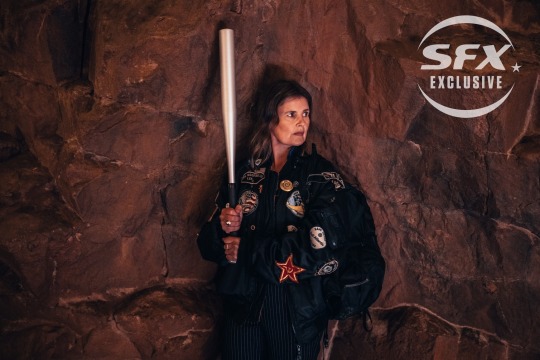
View On WordPress
#Ace#Chris Chibnall#Janet Fielding#Jodie Whittaker#John Nathan-Turner#Remembrance of the Daleks#Seventh Doctor#Silver Nemesis#Sophie Aldred#Survival#Sylvester McCoy#Tegan Jovanka#The Power of the Doctor#Thirteenth Doctor
8 notes
·
View notes
Text
The Secret Finality of “Survival”
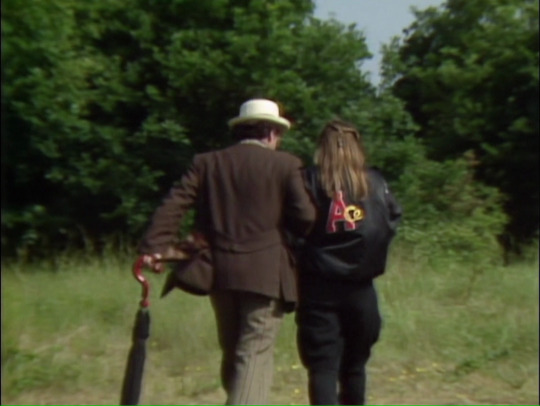
An admirable quality of Doctor Who has always been its ability to adapt to change. From it’s genesis, it has overcome budget restraints and technical setbacks to the delight of many. Not even the need to replace their main actor could stop Doctor Who. It’s not easy then to try and dissect exactly why Doctor Who could not survive the 1980’s. There are key moments when the show alienated viewers in a major way, but sometimes shows wear out their welcome with general audiences. Even in the First Doctor era people were asking how much longer the show could continue. Had the show become a parade of changing faces? It’s ironic then that it was Patrick Troughton’s fresh face which reignited the mystery of the Doctor. Just when you thought you knew the Doctor, he became someone else entirely. Over the years, Doctor Who’s ability to renew itself proved to be its greatest asset. Sadly, however, the Sylvester McCoy era was to be the last regeneration for the original series of Doctor Who.
When production on season 26 began in 1988, rumours of cancellation were already in the air. Not only had public opinion shifted away from the show in dramatic fashion, but the budget had been gutted forcing more difficult and less controlled location shooting. Before the season had finished airing, the production crew knew there would be no season 27. Producer John Nathan-Turner was forced to scramble for some sort of final episode to cap off 26 years of a BBC family tradition. The season was originally supposed to end with “Ghost Light,” but it was decided that the three-part story “Survival,” would function better as a finale. At first glance, it’s easy to think “What? Why?” But I would argue that the reason is that it was always leading back to the Master, of course.
Doctor Who could probably have continued to battle monsters across space and time going from face to face for years. But even the Troughton era’s new visage could not overcome the rut writers had found themselves in with aimless base-in-peril stories. The Doctor needed a more personal threat. Daleks and Cybermen were of course classic baddies, but they were generally faceless and emotionless. Perhaps the villains should also have a face. Some of the more popular one-off antagonists were individuals who possessed strong wills and personalities. For example- the Toymaker, the Meddling Monk, Mavic Chen, or the ironically faceless Great Intelligence. It wasn’t until the Pertwee Era did the Doctor find his ultimate foe in the Master.
The introduction of the Time Lords sacrificed a bit of the mystery of the Doctor’s character. Suddenly, the cosmic vagabond had a home and a species. It’s only fair that in this sacrifice, we gained the Doctor’s perfect antagonist. The Master is everything the Doctor isn’t, while being exactly what the Doctor is. They both know the secrets of time travel. They both regenerate. They both have TARDISes. But the Master is that twisted reflection of the Doctor. The Twelfth Doctor once said “Sometimes the only choices you have are bad ones, but you still have to choose.” But in the trolley problem that is life, the Master’s choices are self-serving and sadistic. The Master is the man who would have still bashed the caveman’s skull with a rock. This sort of sadism, masculinity, and war are at the forefront of first-time Doctor Who writer Rona Munro’s script.
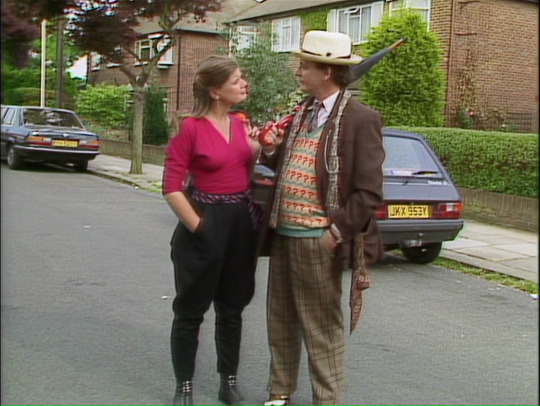
Having recently explored Ace’s personal history in both “Ghost Light,” and “The Curse of Fenric,” it seems fitting that the Doctor and Ace should end up back in her hometown of Perivale. While the character arc of learning why she burned down the Gabriel Chase mansion as a child seems like a fitting end for her character, I would argue it’s just as interesting to see Ace return home. Rarely in classic Doctor Who were we shown the companions returning home, and usually it was always to say goodbye. Had we seen a season 27, this would have marked the first time a companion returned home only to continue travelling with the Doctor. This is just one of many ways in which Ace was the proto-modern companion. We often see modern Doctor Who companions returning home to check in with family and have a cuppa. These moments give us a glimpse into the way travelling with the Doctor has changed them. Ace’s reaction to Perivale is on par. But it’s not just Ace who has changed while she was away. Things in Perivale don’t exactly add up. Old friends have gone missing. And the local community centre is now populated by macho self-defence classes taught by a paranoid military man named Paterson.
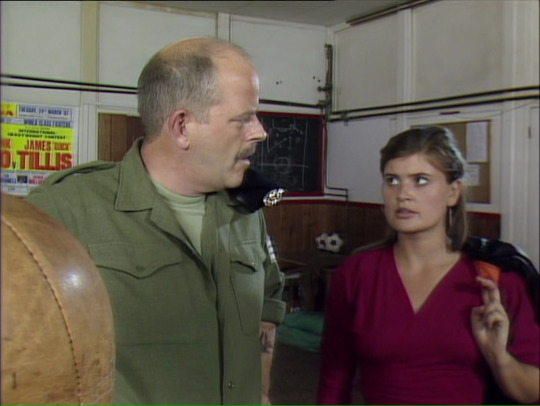
I mentioned earlier that the budget put massive strains on the production crew. Despite this, they make excellent use of story craft. “Survival,” plays out more like an independent film than a serial from a classic BBC series. In some respects, this was Doctor Who back to its roots- a small ragtag crew putting emphasis on writing and creative problem-solving. There is an attempt at atmosphere. Perivale feels gritty and a bit run down, a detail Munro attributed to the town due to her own youth in a grittier Scotland under Margaret Thatcher. She would later reflect that when she actually saw Perivale, she found it charming. Mind you, the real Perivale never acted as a nexus for extraterrestrial kitty cats. And as a cat owner myself, those little fuckers do not respect personal property. They dig up the garden. They claw the sofa. They make nerds washing their cars disappear.
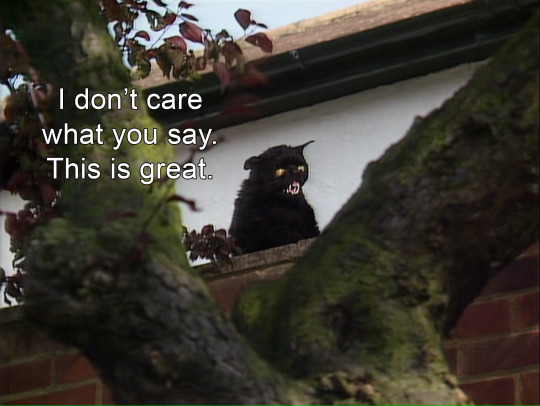
It would be easy to say that these first couple of episodes are sparse. Their synopses are among the shortest you’ll find on TARDIS Data Core. But that doesn’t mean they’re entirely empty either. The script to David Lynch’s Eraserhead was only 20 pages and it made an 88-minute film that my wife said felt like three hours. I would argue that building tone can be just as effective as narrative. Much of the first episode in particular feels like building a sense of desperation. There is desperation to leave Perivale. Desperation to find the missing youth of the town. Desperation to survive.
Perhaps the most desperate to survive is the Master. We’ve seen him on his last regeneration. We’ve seen him extra crispy. In the Eighth Doctor movie we see him so desperate to escape death that he’ll snake his way down Eric Roberts’ throat. And here we find the Tremas Master, wearing someone else’s face using the minds and bodies of the youth of Perivale to escape a sentient planet where he got himself trapped. For a newer writer and first timer to Doctor Who, I would argue that Munro absolutely nails the Master’s character. The Master will stoop to anything that will ensure his survival. It’s in his name. He must control others. He must control his destiny. He refuses to let death be his master. Even years later when John Simm’s Master chooses death, it is in his defiance of the Doctor. It is his refusal to let the Doctor control him. In the Master’s mind, other people exist only to serve his means.
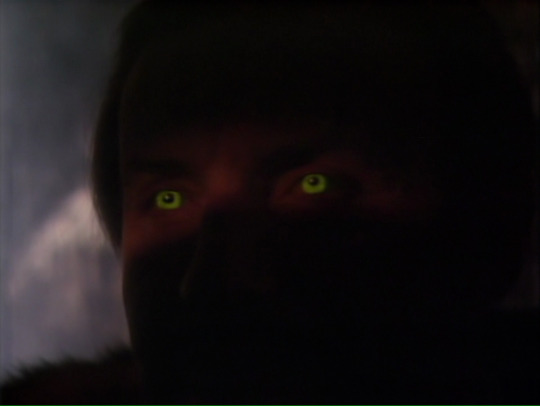
Meanwhile, the equally astounding eternal god that is the Doctor is having trouble with catfood and the neighbourhood watch. I find no end of enjoyment in watching the Doctor shoo a dog away from cat food, so much so that I made it into a ten-minute loop. He’s escaped a Dalek holding cell, survived a murderous satellite, and avoided ritualistic execution. But at this moment, he just needs this dog to stop eating his cat food long enough to trap a Kitling. Having been spotted hiding away in some old nan’s garden, the neighbourhood watch is called in to see to the Doctor. This brings us back to Paterson, because of course it does. Paterson is exactly the kind of twit to be up in everyone’s business. I don’t blame the old nan though, you do what you gotta do to feel safe, boo.

It’s Ace’s scream that brings the Doctor and Paterson to the playground where Ace is being chased about by a “Cheetah People.” They really dug deep on that name there. Something I found myself enjoying was the way in which Ace used the metal playground structures to evade capture. It made me think about how Ace may have played in this very jungle gym as a child. Would she have made up stories in her head where she pretended to evade invisible enemies? In this way, Ace has a home-team advantage. This advantage is short-lived, however, after she is transported to the Cheetah Planet (another cracker of a name). The Doctor and Paterson also find themselves transported under its red sky as the Master stands by to greet them.
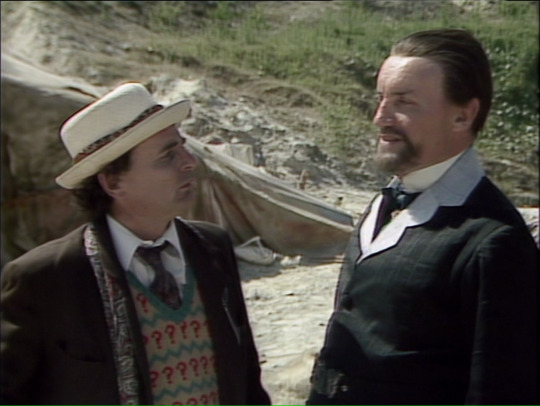
I joke about the name of the Cheetah Planet and the Cheetah People, but I do actually like some of the ambiguity. Sure, it maybe sounds like Charleton Heston is about to find half a Statue of Liberty, but I like that they’re a bit of a mystery. Even though the Doctor has heard of them, he doesn’t really know anything about them. We don’t know what to expect from our feline friends, but the introduction of the Master shows us that they’re probably victims as well. Once again the Master is using others for his own purposes.
Storywise, I would say episode two is probably the weakest of the three. Most of the episode is Ace avoiding Cheetah People and discovering her missing friends from Perivale, some of whom have been surviving on the Cheetah Planet for weeks. Something about the Cheetah Planet causes people to become feral. First changing their minds and slowly, over time, their bodies as well. This primal source holds the power to transform people into Cheetah People. Now, when Munro had originally written the script, she was thinking something a little more subtle. The Cheetah People were never meant to be in full masks, but rather closer to the facial prosthetics of Star Trek. You would have been able to see the actor’s performance underneath their new catlike features.
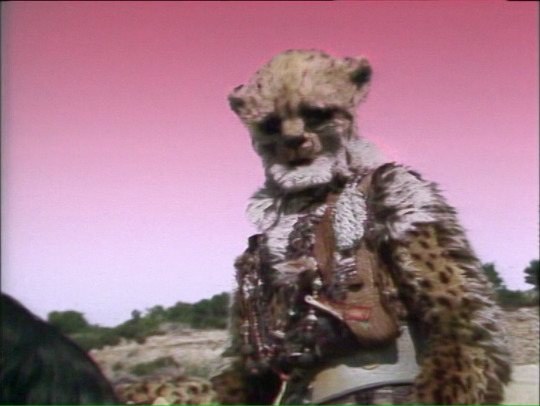
I mention this because the look of the Cheetah People is a sticking point for a lot of fans. Not even the cast or crew were happy with their look. Even Rona Munro complained that the masks were distracting from her lesbian subplot between Ace and Karra. Because if you can look beyond the mask, you’ll find a deeper story. While some furry Whovians out there may not have much trouble accepting a story about Cheetah People in bad fursuits, to others it was offputting. Because of that, I think Survival struggled and continues to struggle with being taken seriously. For me, it’s on par with “The Web Planet,” and the Menoptera, a similar story and creature that are often maligned by people who find them embarrassing. And like “The Web Planet,” you’ll find a story about anthropomorphic animals being controlled by a single sadist. They’re like Doctor Who’s Ewoks in that way. And like Ewoks, some people think they’re a mistake. Those people are wrong, by the way.
The Master does his best to look as though the Doctor has fallen into his trap, but what seems like a grand scheme is little more than a last-ditch effort to escape the Cheetah Planet. Due to the Kitlings’ ability to trap people there, the Master’s hope is to use this power to leave. He makes a great effort to look like the supreme overlord of this empire of dirt, but the Doctor sees right through him as always. He sees the Master’s gambit for what it is- the boasts of the most powerful man in prison. And the longer the Master finds himself on this forsaken planet, the less control he feels. Sure, the Master loves a bit of carnage, but it’s this loss of self that frightens him. Losing control of himself to the wild nature of the Cheetah Planet is another form of death, and as we know, the Master possesses a deep seated fear of losing control.
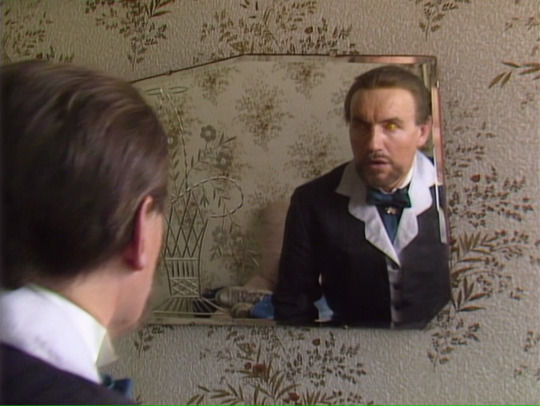
You’ll forgive me if my memory of the events that follow are a bit hazy. I’ve seen Survival several times and even now I struggle to recall key plot points. What’s important is that Ace has formed a bond with one of the Cheetah People, Karra (played by Doctor Who royalty Lisa Bowerman), and their running together has begun to turn Ace feral. It’s implied that running with the Cheetah People hastens the transition into ferality, but even with that consideration, Ace’s change feels abrupt. Some of Ace’s cohorts had been trapped for weeks without so much as a whisker. It’s a minor gripe from a serial plagued with minor gripes. I’m probably being fairer to Survival than I normally would because of the extenuating circumstances surrounding the production. An inexperienced writer, a show on the brink of cancellation, and a budget slashed to hell do this story no favours. In that way, it feels like a mean thing to judge it too harshly. And as we’ve seen from her return with “The Eaters of Light,” Munro can actually write.
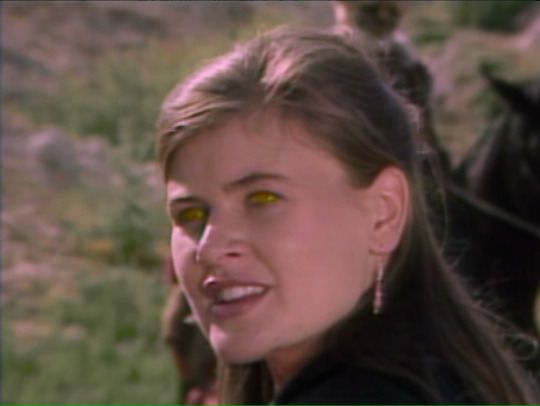
Another thing this story does that acts as a sort of pre-cursor to modern Doctor Who (or in the continuity of the show- its very next episode) is the way the Master will take on companions of his own. Much like Chang Lee, Ace’s pal Midge is lied to and manipulated by the Master. The Master uses his feral nature to transport him back to Perivale which is exactly what he wanted. We can hand wave away how the Master knew Ace and the Doctor would ever return to Perivale long enough to notice all of Ace’s mates have gone missing. Like I said, minor gripes. Now in Perivale with kitty cat Midge, the Master literally pilots Midge around looking to recruit more young men into his harem… er… army.

Having escaped a catastrophe with the Cheetah People (with no thanks to the cowardly Paterson) the Doctor and Ace are now back in Perivale ready to square off against the Master and his group of misanthropes who may as well be carrying tiki torches if it wasn’t for the fact that it was broad daylight. The big showdown, however, appears in the form of the Doctor and Midge running motor bikes at one another in a game of chicken. By that description, the scene sounds less clever than it actually is, but when you follow the theme of the story, it says a lot. Initially, it is Ace who volunteers to run down Midge, but the Doctor knows if she were to engage, it would turn her completely feral. Knowing that his own mind is at stake, the Doctor still takes her place, refusing to let her fight his battles for him. The Master, on the other hand, is far more comfortable sending Midge in his stead. At this moment, we are given a visual representation of the fundamental difference between the Doctor and the Master’s ideologies. It is this scene that makes me believe Survival is actually the best choice they could have made for a final Doctor Who story.

Unable to accept defeat and leave well enough alone, the Master pulls the Doctor back to the Cheetah Planet for one final bestial showdown. But even in his increasingly feral state, the Doctor’s compasion overrides the instinct to bash the Master’s brain in with a skull. I referenced the First Doctor’s feeble attempt at bashing a caveman’s skull with a rock, and that wasn’t without reason. In an accidental manner, the show has brought the Doctor around full circle by echoing his first story. Originally it was Ian who had stayed his hand, and now, through years of travelling with human companions, it is the Doctor who stays his own hand. The Doctor refuses to live and die as an animal, and because of this, he is able to walk off into the sunset for future adventures.

Over the years, we learned that the Doctor is a Time Lord from Gallifrey. But even still, the Doctor defies explanation. But through meeting the Master, we learn what the Doctor very easily could have become. We may not know who the Doctor is, but through the Master, we have learned who the Doctor isn’t. In this last story with the Doctor, we don’t learn his name. Very little more information is gained about the Doctor. Instead, it is reiterated what the Doctor believes. Life is sacred. People aren’t pawns. Take responsibility for your problems. We also learn why the Master always loses- he only thinks about himself. Ultimately, it’s community and caring for others that ensures our survival.
#doctor who#Seventh Doctor#Sylvester McCoy#Survival#Rona Munro#Cheetah People#Cheetah Planet#Ace McShane#Sophie Aldred#Ace#Perivale#The Master#Tremas#Anthony Ainley#Season 26#TARDIS#BBC#Time and Time Again#timeagainreviews
39 notes
·
View notes